新概念英语第四册听力资料:Education
新概念英语第四册听力资料:Adolescence
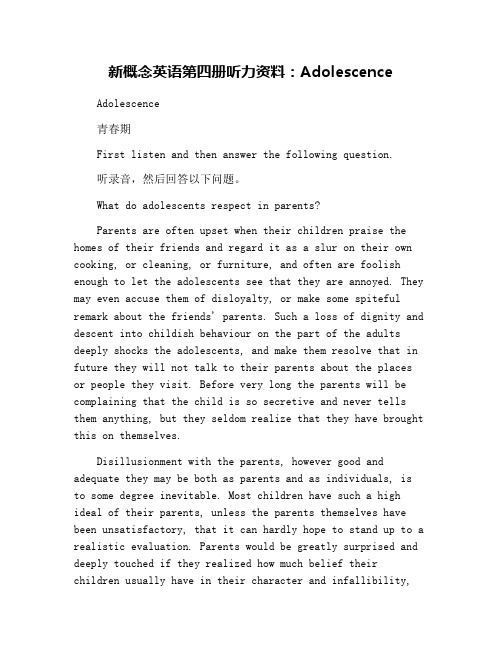
新概念英语第四册听力资料:Adolescence Adolescence青春期First listen and then answer the following question.听录音,然后回答以下问题。
What do adolescents respect in parents?Parents are often upset when their children praise the homes of their friends and regard it as a slur on their own cooking, or cleaning, or furniture, and often are foolish enough to let the adolescents see that they are annoyed. They may even accuse them of disloyalty, or make some spiteful remark about the friends' parents. Such a loss of dignity and descent into childish behaviour on the part of the adults deeply shocks the adolescents, and make them resolve that in future they will not talk to their parents about the places or people they visit. Before very long the parents will be complaining that the child is so secretive and never tells them anything, but they seldom realize that they have brought this on themselves.Disillusionment with the parents, however good and adequate they may be both as parents and as individuals, is to some degree inevitable. Most children have such a high ideal of their parents, unless the parents themselves have been unsatisfactory, that it can hardly hope to stand up to a realistic evaluation. Parents would be greatly surprised and deeply touched if they realized how much belief theirchildren usually have in their character and infallibility,and how much this faith means to a child. If parents were prepared for this adolescent reaction, and realized that it was a sign that the child was growing up and developing valuable powers of observation and independent judgment, they would not be so hurt, and therefore would not drive the child into opposition by resenting and resisting it.The adolescent, with his passion for sincerity, always respects a parent who admits that he is wrong, or ignorant, or even that he has been unfair or unjust. What the child cannot forgive is the parent's refusal to admit these charges if the child knows them to be true.Victorian parents believed that they kept their dignity by retreating behind an unreasoning authoritarian attitude; in fact they did nothing of the kind, but children were then too cowed to let them know how they really felt. Today we tend to go to the other extreme, but on the whole this is a healthier attitude both for the child and the parent. It is always wiser and safer to face up to reality, however painful it may be at the moment.DOTID OFLUM Journey Through AdolescenceNew words and expressions 生词与短语adolescencen.slurn. 青春期adolescentn. 底毁disloyaltyn. 青少年(12-18岁) spitefuladj. 恶意的,怀恨的disillusionmentn. 幻灭感evaluationn. 评价infallibilityn. 一贯准确resentv. 怨恨sincerityn. 诚挚victorianadj. 维多利亚式的retreatv. 后退unreasoningadj. 不凭理智的。
新概念英语第四册课文翻译及学习笔记:Lesson33
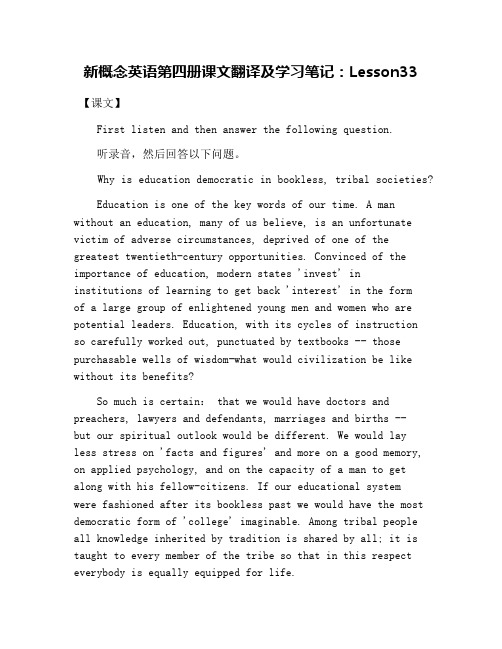
新概念英语第四册课文翻译及学习笔记:Lesson33【课文】First listen and then answer the following question.听录音,然后回答以下问题。
Why is education democratic in bookless, tribal societies?Education is one of the key words of our time. A man without an education, many of us believe, is an unfortunate victim of adverse circumstances, deprived of one of the greatest twentieth-century opportunities. Convinced of the importance of education, modern states 'invest' ininstitutions of learning to get back 'interest' in the formof a large group of enlightened young men and women who are potential leaders. Education, with its cycles of instruction so carefully worked out, punctuated by textbooks -- those purchasable wells of wisdom-what would civilization be like without its benefits?So much is certain: that we would have doctors and preachers, lawyers and defendants, marriages and births --but our spiritual outlook would be different. We would lay less stress on 'facts and figures' and more on a good memory, on applied psychology, and on the capacity of a man to get along with his fellow-citizens. If our educational system were fashioned after its bookless past we would have the most democratic form of 'college' imaginable. Among tribal people all knowledge inherited by tradition is shared by all; it is taught to every member of the tribe so that in this respect everybody is equally equipped for life.It is the ideal condition of the 'equal start' which only our most progressive forms of modern education try to regain. In primitive cultures the obligation to seek and to receive the traditional instruction is binding to all. There are no 'illiterates' -- if the term can be applied to peoples without a script -- while our own compulsory school attendance became law in Germany in 1642, in France in 1806, and in England in 1876, and is still non-existent in a number of 'civilized' nations. This shows how long it was before we deemed it necessary to make sure that all our children could share in the knowledge accumulated by the 'happy few' during the past centuries.Education in the wilderness is not a matter of monetary means. All are entitled to an equal start. There is none of the hurry which, in our society, often hampers the full development of a growing personality. There, a child grows up under the ever-present attention of his parent; therefore the jungles and the savannahs know of no 'juvenile delinquency'. No necessity of making a living away from home results in neglect of children, and no father is confronted with his inability to 'buy' an education for his child.JULIUS E. LIPS The Origin of Things【New words and expressions 生词和短语】adverse adj. 不利的purchasable adj.可买到的preacher n. 传教士defendant n. 被告outlook n. 视野capacity n. 水平democratic adj. 民主的tribal n. 部落的tribe n. 部落illiterate n. 文盲compulsory adj. 义务的deem v. 认为means n. 方法,手段,财产,资力hamper v. 妨碍savannah n. 大草原juvenile adj. 青少年delinquency n. 犯罪【课文注释】1.adverse adj. 不利的, 逆向的, 有害的例句: The development was adverse to our interests.这种发展与我们的利益背道而驰。
新概念英语第四册精讲—听力课堂
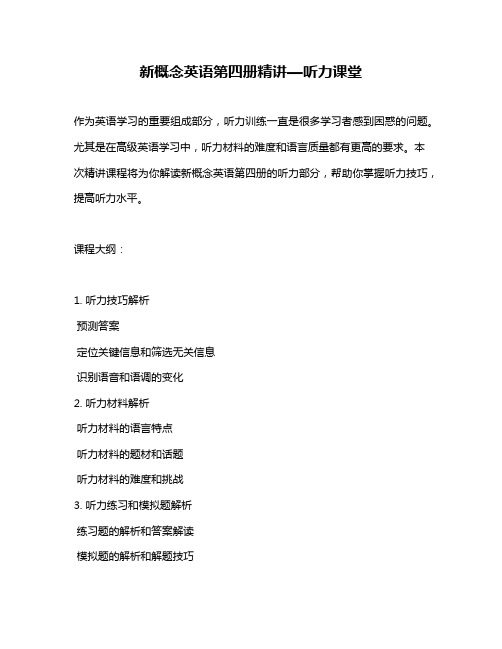
新概念英语第四册精讲—听力课堂
作为英语学习的重要组成部分,听力训练一直是很多学习者感到困惑的问题。
尤其是在高级英语学习中,听力材料的难度和语言质量都有更高的要求。
本次精讲课程将为你解读新概念英语第四册的听力部分,帮助你掌握听力技巧,提高听力水平。
课程大纲:
1. 听力技巧解析
预测答案
定位关键信息和筛选无关信息
识别语音和语调的变化
2. 听力材料解析
听力材料的语言特点
听力材料的题材和话题
听力材料的难度和挑战
3. 听力练习和模拟题解析
练习题的解析和答案解读
模拟题的解析和解题技巧
4. 听力学习建议和策略
制定听力学习计划
选择适合自己的听力材料
坚持练习和反思
通过本次精讲课程,你将深入了解新概念英语第四册的听力部分,掌握实用的听力技巧,提高自己的听力水平。
同时,你还能获得实用的学习建议和策略,帮助你更好地规划自己的英语学习。
无论你是英语学习者还是教师,相信本次课程都将为你带来有益的启示和帮助。
新概念英语学习大厅听力第四册答案
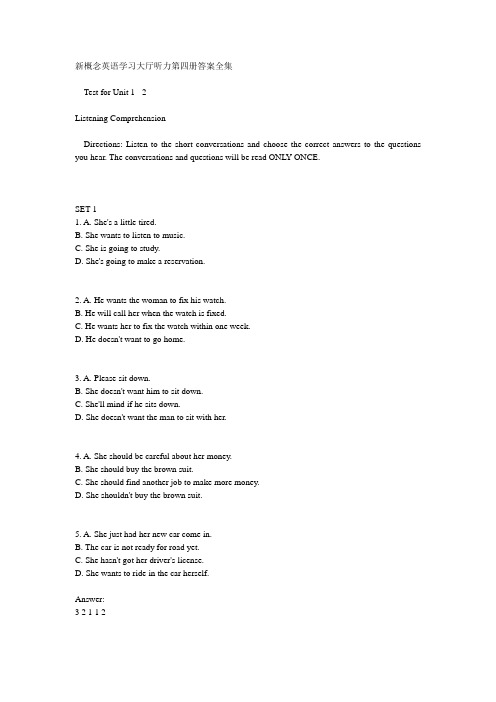
新概念英语学习大厅听力第四册答案全集Test for Unit 1 - 2Listening ComprehensionDirections: Listen to the short conversations and choose the correct answers to the questions you hear. The conversations and questions will be read ONL Y ONCE.SET 11. A. She's a little tired.B. She wants to listen to music.C. She is going to study.D. She's going to make a reservation.2. A. He wants the woman to fix his watch.B. He will call her when the watch is fixed.C. He wants her to fix the watch within one week.D. He doesn't want to go home.3. A. Please sit down.B. She doesn't want him to sit down.C. She'll mind if he sits down.D. She doesn't want the man to sit with her.4. A. She should be careful about her money.B. She should buy the brown suit.C. She should find another job to make more money.D. She shouldn't buy the brown suit.5. A. She just had her new car come in.B. The car is not ready for road yet.C. She hasn't got her driver's license.D. She wants to ride in the car herself.Answer:3 2 1 1 2SET 21. A. Husband and wife.B. They are dating each other.C. Teacher and student.D. Manager and his secretary.2. A. Six hours.B. Ten hours.C. Four hours.D. One hour.3. A. Buying a new typewriter.B. Finding a new place for the typewriter.C. Finding a better typist.D. Questioning the typist.4. A. Barry no longer lives in New York.B. Barry doesn't know how to economize.C. The woman called Barry in California.D. The woman didn't ever meet Barry.5. A. Richard is hard to find.B. Richard speaks with difficulty.C. Richard's roommate doesn't talk to him.D. Richard doesn't work very hard.Answer:2 3 3 1 4Listening ComprehensionDirections: Listen to the conversation and fill in the form below with no more than three words for each blank. The conversation will be read TWICE.SET 1The History of Gardens in the UKAt Roman conquest The Romans began to leave (1) for gardens when building houses.The Roman gardens we know the most about are those of the large (2) and (3) .Fishbourne has been partly (4)The gardens of Anglo-Saxon England The warlike Anglo-Saxons did not (5) gardening to be important.After Normandy conquest in 1066 French people brought not only French (6) but also gardening to Britain.The Middle Ages Gardens once more became (7) in British life.Monasteries had both kitchen gardens and herb gardens to provide the (8) of food and (9) . Nowadays Gardens and gardening are (10) of British daily life.Answer:1. space2. villas3. palaces4. reconstructed5. hold6. civilization7. important8. practicalities9. medicine 10. partSET 2Holidays in the USAEaster It is not a (1) holiday and most Americans spend Easter Sunday with the family.Many believers in this time remember the (2) made by Jesus Christ.Mother's and Father's Day Both days are (3) to our parents because they are really worth it. Memorial Day It honors Americans killed or missing in action in all (4) .National Birthday It commemorates the day in l776 when the (5) adopted the (6) and established the USA.Thanksgiving Day It was a day of thanksgiving and prayer (7) to be shared by all the colonists and (8) Indians.Christmas Even though it is (9) a religious holiday, people are used to many (10) celebrations.Answer:1. national2. sacrifice3. dedicated4. past wars5. thirteen colonies6. Declaration of Independence7. proclaimed8. neighboring9. traditionally 10. secularListening ComprehensionDirections: Listen to the passage and decide whether the following statements are True or False. The passage will be read ONL Y ONCE.SET 11. Through staying with friends, children learn the give and take of social behavior in general. True False2. By interacting with friends, children learn that different people should behave similarly. True False3. Friends can provide both companionship and hostility. True False4. Friendship can help children improve their sense of self-esteem. True False5. Friendships are necessary to our health psychologically. True FalseAnswer:1. True2. False3. False4. True5. TrueSET 21. Friends can help each other by copying class assignments and homework. True False2. Friends make school more fun. True False3. The amount of time with friends will be very important during middle childhood. True False4. Teenagers spend almost half of their waking time in the company of friends. True False5. Adolescents view friendship as a strong and stable tie. True FalseAnswer:1. False2. True3. True4. False5. TrueListening ComprehensionDirections: Listen to the passage and choose the correct answers to the questions. The passage will be read ONL Y ONCE.SET 11. A. In 1700.B. In 500.C. Under the reign of Charles II.D. By the 18th century.2. A. Because the government loved coffee.B. Because the government did not like the smell of tea.C. Because the government's tax revenues from liquor sales were reduced.D. Because tea would do harm to human bodies.3. A. The government made an act to tax tea.B. The government began to tax coffee.C. The government asked the citizens to give up drinking tea.D. Tea was banned by the government.4. A. Tea planting.B. Tea making.C. Tea processing.D. Tea smuggling.5. A. Because they did not like pure tea.B. Because pure tea was too strong.C. Because they wanted to earn more money.D. Because pure tea was not so popular.Answer:1 3 1 4 3SET 21. A. In the past two centuries.B. In the Middle Age.C. From the very beginning of human history.D. In the Bronze Age.2. A. Because it was cheap.B. Because it was easy.C. Because the walls could not sustain much weight.D. Because it was popular.3. A. Cement.B. Wheat straw.C. Reeds.D. Bricks.4. A. Lack of straw.B. Lack of money.C. Better transportation.D. Lack of skillful persons.5. A. Because they prefer the thatched cottages.B. Because thatched cottages are pretty.C. Because thatched cottages can have a good price.D. Because thatched cottages are easy to be built.Answer:4 3 2 3 3Listening ComprehensionDirections: Listen to the passage TWICE and fill the blanks with the missing wordsSET 1An important aspect of American culture is the value placed on progress. In four different areas, we can see how the value of progress (1) the American people. The first area concerns the relationship between parents and their children. Most foreign students have been raised to (2) their parents. They consider and value highly what their parents have taught them. Moreover, what their parents have taught them has (3) become their own standard for living. Because of the idea of progress, most American children believe that their parents' ideas and (4) are not necessarily the best. Americans think that there is always some change to be made for the better. A second area affected by the idea of progress concerns the material world. Many Americans (5) that there are enough material goods for everyone; they tend to think that the supply is (6) . So they are always trying to work for more, more, and still more. A third area (7) the Americans' concept oftime. They are very time-conscious, perhaps because time is such an important factor in the world of business and material (8) . Americans tend to live by the motto, "Time is money." They believe you should use your time well and get the most that you can. The fourth concern is education and (9) . Americans are quite interested in education and new knowledge and they (10) the famous saying, "Never too old to learn." They will make good use of their life to learn as much as possible.Answer:1. affects2. respect3. generally4. standards5. assume6. endless7. involves8. acquisition9. learning 10. appreciateSET 2In the toddler years children begin to establish contact with peers, develop the basic skills of play behavior and show (1) for certain playmates. Preschoolers identify specific children as friends and interact differently with friends than non-friends. With toddlers friendship is not reflected in language, but in the time they spend together (2) in a common activity. During the (3) school years children generally choose friends who are similar to themselves and who share their interests. At this age children become (4) group-oriented; the most well-liked children are those who can manage social relations within a group and think of activities that are fun. Groups reflect most of the problems that exist in all social relationships--inclusion/exclusion, (5) , independence, fear of rejection. They also reflect sex differences. Groups become more (6) ; girls usually have more intimate and supportive relationships with their friends than boys do. Their play groups reflect this difference; boys tend to (7) with peers in large groups centered on sports while girls are more likely to be involved in small groups and spend more time in personal conversation. Girls' friendship groups are usually smaller and more exclusive than boys' during childhood, and then in (8) the situation reverses. As children mature and rely less on their parents for guidance, they turn to their peers. Cliques can be based on appearance, (9) ability, academic achievement, social or economic status, talent, ability to attract the opposite sex, or seeming (10) -- the jocks, the nerds, the brains, the cool kids, etc. Some kids care about belonging to a certain group, suffer from feelings of rejection if they are not included and can become victims of teasing and bullying.Answer:1. preferences2. engaged3. elementary4. increasingly5. conformity6. single-gender7. associate8. adolescence9. athletic 10. sophisticationListening ComprehensionDirections: Watch the video clip and decide whether the following statements are True or FalseSET 11. The man asks his father whether he needs some water. True False2. His father says that having a baby will change everything in life. True False3. His father says that he did do a lot about raising up a kid. True False4. The man asks his father to drink the whole can. True False5. The father does not think it is the time for him to die. True FalseAnswer:1. True2. True3. False4. False5. TrueSET 21. The lady tells the man there is something that the man doesn't know about her. True False2. The man guesses there must be something wonderful. True False3. The lady says that she has a three-year-old girl. True False4. The man says he loves kids. True False5. The man says that he is so glad that she doesn't have any child. True FalseAnswer:1. True2. True3. False4. True5. FalseOral TestDirections: Look at the picture below.SET 1What is the possible relationship between the two persons in the picture?When and where could this conversation happen?How does the little girl misunderstand her teacher's suggestions?SET 2How do you understand the caption below the picture?Do you think the man and the woman share the same emotions?Where could this conversation happen?Oral TestSET 1Before you visit a new country, what will you do to help you understand that country?When buying gifts for your foreign friends, do you think of cultural differences? Why?What problems will be caused by your failure to understand cultural differences when you visit other countries or try to communicate with foreigners?SET 2What kind of friends do you have? How can you get on well with your friends?How important do you value your friendship?Do you agree that "A friend in need is a friend indeed"? Why? Or why not?Choose another TestTest for Unit 1 Test for Unit 2 Test for Unit 3 Test for Unit 4Test for Unit 5 Test for Unit 6 Test for Unit 7 Test for Unit 8Test for Unit 3 - 4Listening ComprehensionDirections: Listen to the short conversations and choose the correct answers to the questions you hear. The conversations and questions will be read ONL Y ONCE.SET 11. A. One hour.B. Two hours.C. Three hours.D. Four hours.2. A. 10:00.B. 10:30.C. 10:45.D. 10:15.3. A. Living in New York.B. Staying in New Mexico.C. Going home to New York.D. In school.4. A. Sue hit a dog.B. The dog hid in a car.C. Sue's dog was hurt.D. Mary went to the veterinarian.5. A. She enjoys playing chess.B. She hates playing chess.C. She cannot play chess.D. She was not a good student.Answer:4 3 2 3 1SET 21. A. He was tired.B. His appointment was changed.C. He had a flat tire.D. His bicycle was stolen.2. A. She was understanding.B. She was apologetic.C. She was annoyed.D. She was careless.3. A. To see the dean.B. To watch the team.C. To weigh himself.D. To give a demonstration.4. A. She's afraid of going out at night.B. She had to do some baking.C. She wanted to get ready for a plane trip.D. She was moving to a new apartment.5. A. Take her typewriter to the repair shop.B. Soundproof her room.C. Work in the basement.D. Listen for her roommate.Answer:3 3 1 3 3Listening ComprehensionDirections: Listen to the conversation and fill in the form below with no more than three words for each blank. The conversation will be read TWICE.SET 1Procedure for SunriseFirst ICANN must provide at least (1) days' notice to the general public of its intention to introduce a new (2) domain.Notice must be in the form of an (3) on ICANN's website.Second ICANN shall post a list of all registrars (4) in the Sunrise Program at least 60 days (5) to the beginning of the Sunrise Period.Then At the end of the 90 days' notice period, a (6) days' Sunrise Period shall begin.A mark owner that is (7) for this program may (8) a domain name registration application to register a domain name which is the same as the mark it owns.Finally At the end of the Sunrise Period, the top-level domain shall be open for (9) of domain names to the (10) .Answer:1. 902. top-level3. announcement4. participating5. prior6. 307. eligible8. submit9. registration 10. general publicSET 2Types of PartnersGeneral partner It is defined as a member who takes an (1) in the management of the partnership and is (2) for all the partnership's debts.Limited partner A "limited partner" is (3) a share of the profit but not to take part in the partnership's management and his (4) for the debts is limited to his (5) contribution. Sleeping partner A partner who (6) capital and shares profits and losses but takes (7) in management.Quasi-partner It refers to a person who has allowed (8) to form that impression that he is a partner in the partnership, thus he cannot deny (9) to anybody who has relied on the (10) and a "quasi-partner" has no right to a share of profits but is fully liable for losses.Answer:1. active part2. fully liable3. entitled to4. liability5. capital6. contributes7. no part8. outsiders9. membership 10. misrepresentationListening ComprehensionDirections: Listen to the passage and decide whether the following statements are True or False. The passage will be read ONL Y ONCE.SET 11. In Puerto Rica, the men who dance with the bride will give gifts to the new couple. True False2. Puerto Rican traditional bridal etiquette has been criticized. True False3. According to Eastern European tradition, the bride will wear a veil at the wedding ceremony. True False4. According to Eastern European tradition, the cap was the sign of a woman's married state. True False5. In Eastern Europe, the capping was marked with happiness of the bride after marriage. True FalseAnswer:1. False2. True3. False4. True5. FalseSET 21. Many tea enthusiasts realize that growing tea herbs at home is quite easy. True False2. Growing tea herbs at home can enhance tea enthusiasts' enjoyment of tea. True False3. The process of harvesting herbs for tea is demonstrated in a Chinese tea exhibition. True False4. Mike Shepherd explains that the leaves can not be used fresh. True False5. The fresh leaves will produce a strong flavor. True FalseAnswer:1. True2. True3. False4. False5. FalseListening ComprehensionDirections: Listen to the passage and choose the correct answers to the questions. The passage will be read ONL Y ONCE.SET 11. A. At a stadium.B. At a large reception hall.C. At the groom's house.D. At the bride's house.2. A. The bride.B. The groom.C. A gramophone.D. A live band.3. A. Arabic food.B. American food.C. English food.D. Chinese food.4. A. Red.B. Pink.C. White.D. Purple.5. A. Bride's sister.B. Bride's father.C. Bride's mother.D. Bride's brother.Answer:2 4 23 2SET 21. A. The importance of family and community.B. The position of the bride.C. The importance of the groom.D. The importance of the priest.2. A. About 3 to 4 people.B. About 300 to 400 people.C. About 3,000 to 4,000 people.D. About 10 people.3. A. A marriage was something individual.B. A marriage was a joining of two persons.C. A marriage was a joining of two families.D. A marriage was very holy.4. A. Wedding date can be any day.B. Certain time of year was best for weddings.C. Wedding day should be rainy day.D. Wedding day should be with sunshine.5. A. In summer.B. At the beginning of a year.C. At the end of a year.D. After the harvest.Answer:1 2 3 2 4Listening ComprehensionDirections: Listen to the passage TWICE and fill the blanks with the missing wordsSET 1Religious beliefs have a strong effect on the way some people celebrate their birthday. Since people thousands of miles apart can share the same (1) beliefs, the following customs have been (2) by religion instead of geographic location.In Muslim cultures, people thank God following the birth of a child by giving gifts to the poor. After the child is a week old, its head is (3) . The family then donates an amount of silver equal to, and often more than, the weight of the child's hair. Following this (4) , family and friends come together for a (5) and a naming ceremony. It is expected that some of the food will be given to those in need as well.According to religious (6) , Hindu children only celebrate their birthdays until they are 16. Until then, however, they do not go to school on their birthdays. Instead, a birthday is (7) with a religious ceremony where a priest blesses the child. On a Hindu child's first birthday, his or her head is shaved while being held by a special fire. (8) of the hair cleanses the child of any evil in past lives, (9) a renewal of the soul.In many Jewish communities, a male child's hair is not cut until he is three years old. On his third birthday, the boy's first (10) is accompanied by a special ceremony, which also symbolizes the beginning of the child's Jewish education.Answer:1. spiritual2. divided3. shaved4. ritual5. feast6. customs7. observed8. Removal9. symbolizing 10. haircutSET 2Do you know why we celebrate birthdays? This social custom is really an (1) event--one that has been with us for millennia. In fact, birthdays and the annual (2) of these times -- both as a society and for individuals -- is the oldest of celebratory rites, and one that arose in every culture as soon as they had any sort of (3) .Naturally, the first real calendar has to do with the sun and the moon's position--the fundamental tools of astrologers today. The ancients celebrated not because some (4) said that people should celebrate, but because of practical everyday (5) , like all astrological lore. The wise men and women noticed that when the sun hit the same spot in the heavens that it held on a person's birthday ..., that day turned out to be extremely (6) .Presents were bestowed--both from others and from the universe. The wise elders saw this (7) happening all the time. And just as most basic astrological information came about based on these days, the astrologers/priests saw that a "pattern" was (8) .This lucky pattern brought joy, and thus the birthday person wanted to celebrate. His or her friends (9) gave to them some presents and the birthday celebrant wanted to share his or her pleasure, so a big (10) was held.Answer:1. astrological2. observance3. calendar.4. edict5. experience6. fortunate.7. phenomenon8. occurring.9. naturally 10. gatheringListening ComprehensionDirections: Watch the video clip and decide whether the following statements are True or FalseSET 11. The father tells the two boys to go to church to pray. True False2. According to the father, the mother worried about the two boys for the whole day. True False3. The mother says that Mrs. Cample rang them about the boat. True False4. The two boys say they made the boat on their own. True False5. The two boys say that borrowing the boat is not their idea. True FalseAnswer:1. True2. False3. True4. False5. FalseSET 21. The old man asks the young man to join him in his office. True False2. The lady tells Wilbur that the couple is waiting for him. True False3. Wilbur thinks life is more important than the couple's waiting. True False4. The young man does not think a boy can be named as Dorrit. True False5. Wilbur is quite satisfied with the word "little". True FalseAnswer:1. False2. True3. False4. True5. FalseOral TestDirections: Look at the picture below.SET 1Whose birthday could it be?How do Chinese people usually do to celebrate their birthdays?SET 2What do you think of the role the computer plays in our everyday life?Has it freed us from the chores and improved the quality of our life?Or has it brought about the high rate of unemployment?Oral TestSET 1What do you think of globalization?What is the benefit brought by globalization?What are the disadvantages of globalization?SET 2Explain how to use Microsoft Word on computer, including how to start the computer.Choose another TestTest for Unit 1 Test for Unit 2 Test for Unit 3 Test for Unit 4Test for Unit 5 Test for Unit 6 Test for Unit 7 Test for Unit 8Test for Unit 5 - 6Listening ComprehensionDirections: Listen to the short conversations and choose the correct answers to the questions you hear. The conversations and questions will be read ONL Y ONCE.SET 11. A. She's too sick to have visitors.B. She picked up her brother last night.C. Her brother's flight was canceled.D. Her brother has changed his plans.2. A. He has a very high phone bill this month, too.B. The woman should contact the phone company.C. The woman should make fewer long-distance calls.D. He'll help the woman pay her phone bill.3. A. She realizes the equipment is easily damaged.B. She won't forget to put away the equipment.C. She always performs experiments carefully.D. She's worried about the results of her experiment.4. A. Help Flora with her paper next week.B. Ask Flora to clean the apartment by herself.C. Ask someone else to clean the apartment with Flora.D. Ask Flora to wait until next weekend to do the cleaning.5. A. Turn on the television.B. Change the channel immediately for the woman.C. Continue watching the nature program.D. Check to see when the nature program is on.Answer:4 3 2 4 3SET 21. A. Call for the latest weather report.B. Ask the woman for direction to the library.C. Go to the library to do research for the field trip.D. Call his professor about the field trip.2. A. She needs to find a different roommate.B. She thinks the man should get a haircut.C. She didn't recognize the man because of his haircut.D. Few people have noticed her roommate's haircut.3. A. Arrive at class on time.B. Finish his assignments more promptly.C. Get his watch fixed.D. Get notes about the class from a friend.4. A. She agrees with the man.B. She hasn't been to a game recently.C. She doesn't think the team has been playing well.D. She doesn't know much about baseball.5. A. He has never been to the auditorium.B. He wants to stop and ask for directions.C. The woman won't be late.D. The program in the auditorium has already begun.Answer:4 4 1 3 3Listening ComprehensionDirections: Listen to the conversation and fill in the form below with no more than three words for each blank. The conversation will be read TWICE.SET 1How to Remember People's NameFace association Examine a person's face (1) when you are introduced. Try to find (2) -- ears, hairline, (3) , (4) , eyes, nose, mouth, chin, complexion, etc.(5) between that (6) , the face, and the name in your mind.Repetition When you are introduced, ask for the person to (7) . Use the name yourself as often as possible ((8) !). If it is unusual, ask how it is spelled or where it comes from, and if appropriate, (9) . Keep in mind that the more often you hear and see the name, the more likely it is to (10) .Answer:1. discreetly2. an unusual feature3. forehead4. eyebrows5. Create an association6. characteristic7. repeat his name8. without overdoing it9. exchange cards 10. sink inSET 2Building WealthBudgeting Establishing a budget is an essential first step toward building a (1) and increasing your (2) . To prepare and use a budget successfully, you'll need to plan for the expected and (3) -- a process that involves (4) and controlling future income and expenses. A budget will help you find ways to (5) to increase your wealth.Saving and investing The concept of putting money away, as opposed to spending all of it, is (6) of wealth-building -- and not a new one. We have various ways to (7) money -- from the traditional passbook savings account to various money (8) . Some prefer these slower, steadier processes of accumulating money, with little (9) . Others prefer to invest in the hopes of creating more money. (10) will have a potentially greater fluctuation.Answer:1. healthy financial statement2. net worth3. the unexpected4. monitoring, adjusting5. generate more money6. a basic principle7. store and accumulat8. market vehicles9. risk of loss 10. More aggressive investmentsListening ComprehensionDirections: Listen to the passage and decide whether the following statements are True or False. The passage will be read ONL Y ONCE.1. "Career brides" earned about one thousand dollars for each marriage. True False2. The grooms got Green Cards for their money. True False3. The woman has been charged with perjury and fraud as she applied for twenty-seven marriage licenses. True False4. It's reported that twelve women involved in the scam have been charged. True False5. The "career brides" spread the idea of selling themselves as brides by word of mouth. True FalseAnswer:1. True2. True3. False4. False5. TrueSET 21. In the USA dreams of wealth and money would come true with steady endeavor and persistence. True False2. Many of Internet billionaires are bright but modest immigrants. True False3. Some 400 years ago the first settlers arrived in the USA to seek fortune. True False4. The line between wealth and political influence was always very distinct. True False5. This article might be an introduction to a reference book of US wealthy families. True FalseAnswer:1. True2. True3. False4. False5. TrueListening Comprehension。
新概念英语第四册教材

新概念英语第四册教材Title: The Essence of New Concept English Book 4。
New Concept English Book 4 embodies the pinnacle of language mastery, offering a comprehensive and profound exploration of the English language. This esteemed textbook, renowned for its rigorous yet accessible approach,continues the tradition of providing students with a solid foundation in grammar, vocabulary, and language structures. However, what sets Book 4 apart is its focus on refined language skills and cultural insights.Grammar, always a crucial aspect of language learning,is explored in greater depth in Book 4. Complex sentence structures, advanced tense variations, and sophisticated verb forms are introduced, challenging students to push the boundaries of their linguistic capabilities. This emphasis on grammatical nuances not only enhances communicationskills but also cultivates a deeper understanding of the language's inner workings.Vocabulary expansion is another key focus of New Concept English Book 4. The lessons are rich in new words and phrases, introducing students to a vast array of terminologies across various domains. This diverse vocabulary exposure not only broadens linguistic horizons but also equips students with the tools to express themselves more precisely and eloquently.Beyond grammar and vocabulary, Book 4 places a strong emphasis on reading comprehension and critical thinking. The lessons are designed to engage students in critical analysis, encouraging them to question, interpret, and evaluate the text. This approach cultivates a deeper understanding of the material and fosters a love for reading and lifelong learning.Moreover, the cultural insights embedded throughout Book 4 are invaluable. The lessons often draw upon historical and cultural backgrounds, providing students with a contextual understanding of the language. This cultural immersion not only enhances language proficiencybut also broadens students' cultural horizons, preparing them for a globalized world.The writing skills addressed in New Concept EnglishBook 4 are equally impressive. Students are guided through the process of crafting coherent and well-structured essays, learning to express their ideas clearly and persuasively. This focus on writing development complements the reading and speaking skills, rounding out the language learning experience.Overall, New Concept English Book 4 is a comprehensive and rigorous textbook that takes students to the next level of language mastery. Its emphasis on grammatical nuances, vocabulary expansion, reading comprehension, critical thinking, cultural insights, and writing skills makes it a standout resource for anyone seeking to achieve excellencein English. With its blend of traditional language teaching methods and modern educational technologies, New Concept English Book 4 remains a timeless and invaluable tool for language learners worldwide.。
新概念英语第四册精讲—听力课堂

新概念英语第四册精讲—听力课堂全文共四篇示例,供读者参考第一篇示例:新概念英语第四册精讲—听力课堂新概念英语第四册是一套非常经典的英语教材,它以听说读写的全面提高学生的英语水平。
听力部分尤为重要,因为良好的听力能力是学习英语的基础,也是日常交流中必不可少的技能。
本文将重点介绍新概念英语第四册的听力课堂,帮助学生更好地学习和掌握听力技巧。
1. 听力材料:听力课堂的首要任务是让学生听懂并理解所听到的内容。
新概念英语第四册的听力材料选择了一些日常生活中常见的对话和情景,内容生动有趣,贴近学生的实际生活。
通过听这些材料,学生可以学习到地道的英语表达方式,培养语感和口语表达能力。
2. 听力训练:听力课堂不仅是让学生听一些材料,还会进行一些听力训练,帮助学生提高听力水平。
训练的形式可以是听后回答问题,听后复述内容,听后完成任务等。
这些训练可以帮助学生更加专注地听,提高听辨能力和听懂能力。
3. 听力技巧:听力课堂会教给学生一些听力技巧,帮助他们更好地应对各种听力考试。
如何提高听力速度,如何捕捉关键信息,如何根据上下文猜测意思等。
这些技巧是听力学习的黄金法则,可以帮助学生更高效地学习和应用。
4. 听力评估:听力课堂会对学生进行听力评估,检测他们的听力水平和听力进步情况。
评估的形式可以是听力考试,听力练习,听力作业等。
通过评估,学生可以了解自己的听力水平,并及时调整学习方法,提高学习效果。
在听力课堂中,学生需要做到以下几点:1. 认真聆听:在听力课堂上,学生要认真聆听老师给出的听力材料,尽量不要漏掉任何细节。
只有全神贯注地听,才能更好地理解内容。
2. 主动参与:学生要积极主动地参与听力训练和听力评估,勇于提问和回答问题。
只有多加练习,才能提高听力水平。
3. 注重练习:学生要在课后进行听力练习,巩固所学内容。
可以选择一些听力材料进行跟读和模仿,提高听力技能。
4. 多维学习:除了听力课堂,学生还可以通过一些英语听力网站、听力软件等多种渠道进行听力学习,提高听力技能。
新概念英语第四册第33课-Education
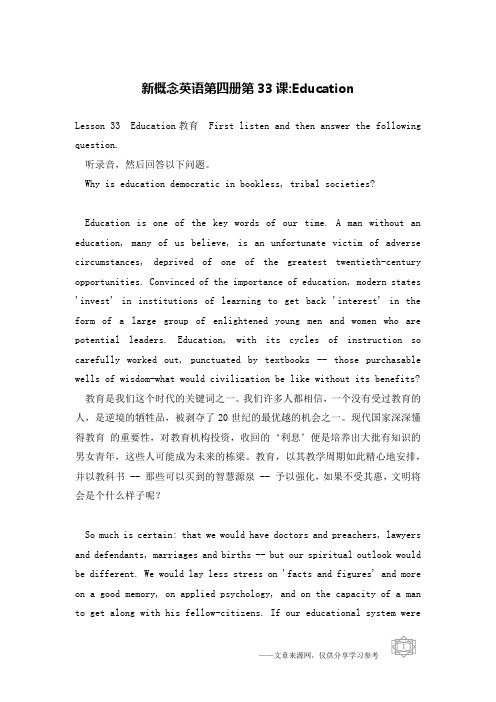
新概念英语第四册第33课:EducationLesson 33 Education教育 First listen and then answer the following question.听录音,然后回答以下问题。
Why is education democratic in bookless, tribal societies?Education is one of the key words of our time. A man without an education, many of us believe, is an unfortunate victim of adverse circumstances, deprived of one of the greatest twentieth-century opportunities. Convinced of the importance of education, modern states 'invest' in institutions of learning to get back 'interest' in the form of a large group of enlightened young men and women who are potential leaders. Education, with its cycles of instruction so carefully worked out, punctuated by textbooks -- those purchasable wells of wisdom-what would civilization be like without its benefits? 教育是我们这个时代的关键词之一。
我们许多人都相信,一个没有受过教育的人,是逆境的牺牲品,被剥夺了20世纪的最优越的机会之一。
新概念英语第四册精讲

新概念英语第四册精讲English:In the New Concept English Book Four, students will continue developing their English language skills through a series of carefully structured lessons. The book covers a wide range of topics including travel, personal experiences, relationships, and everyday activities. It also includes exercises and activities to reinforce and apply the language learned. One of the key features of Book Four is the focus on more advanced grammatical structures and vocabulary, helping students to build on their existing knowledge and expand their language proficiency. Additionally, the book provides opportunities for students to practice speaking, listening, reading, and writing in various contexts, helping them to become more confident and proficient English speakers.中文翻译:在《新概念英语》第四册中,学生将通过一系列精心设计的课程继续发展他们的英语语言技能。
喜马拉雅 新概念英语第四册
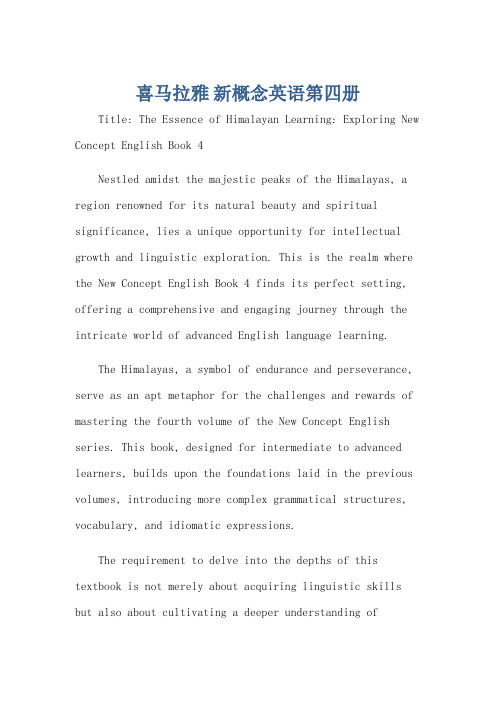
喜马拉雅新概念英语第四册Title: The Essence of Himalayan Learning: Exploring New Concept English Book 4Nestled amidst the majestic peaks of the Himalayas, a region renowned for its natural beauty and spiritual significance, lies a unique opportunity for intellectual growth and linguistic exploration. This is the realm where the New Concept English Book 4 finds its perfect setting, offering a comprehensive and engaging journey through the intricate world of advanced English language learning.The Himalayas, a symbol of endurance and perseverance, serve as an apt metaphor for the challenges and rewards of mastering the fourth volume of the New Concept English series. This book, designed for intermediate to advanced learners, builds upon the foundations laid in the previous volumes, introducing more complex grammatical structures, vocabulary, and idiomatic expressions.The requirement to delve into the depths of this textbook is not merely about acquiring linguistic skills but also about cultivating a deeper understanding ofEnglish culture and society. The lessons within are carefully crafted to reflect the nuances of the language, its historical evolution, and its application in real-world contexts.One of the key aspects of New Concept English Book 4 is its emphasis on reading comprehension. The texts are diverse, ranging from narratives to expository essays, all designed to test and enhance the reader's ability to understand and analyze complex ideas. The use of authentic language and a wide range of topics ensures that learners are not only improving their language skills but also broadening their horizons.Moreover, the book places a strong emphasis on writing skills. Through a series of writing exercises, learners are encouraged to express their thoughts and opinions in aclear and coherent manner. This not only helps in honing linguistic proficiency but also cultivates criticalthinking and creativity.The integration of listening and speaking skills is another notable feature of New Concept English Book 4. Through a variety of audio materials and conversationalactivities, learners are able to practice their pronunciation, fluency, and comprehension in a practical and engaging manner.The Himalayas, with their serene beauty and profound spirituality, provide an ideal backdrop for this intellectual journey. As learners delve into the depths of the book, they can draw inspiration from the resilient spirit of the mountains, applying it to their own pursuit of linguistic excellence.In conclusion, New Concept English Book 4 represents a significant milestone in the journey of English language learning. Its comprehensive approach, diverse content, and focus on practical skills make it an invaluable resource for intermediate to advanced learners. By embracing the challenges and rewards of this textbook, learners can not only enhance their linguistic proficiency but also broaden their cultural horizons, much like the vast and enchanting landscapes of the Himalayas themselves.。
新概念英语第四册听力资料:William S.Hart and the early‘Western’
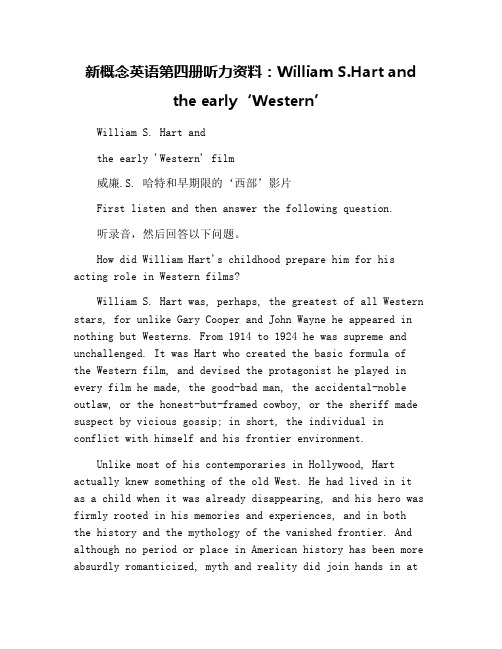
新概念英语第四册听力资料:William S.Hart andthe early‘Western’William S. Hart andthe early 'Western' film威廉.S. 哈特和早期限的‘西部’影片First listen and then answer the following question.听录音,然后回答以下问题。
How did William Hart's childhood prepare him for his acting role in Western films?William S. Hart was, perhaps, the greatest of all Western stars, for unlike Gary Cooper and John Wayne he appeared in nothing but Westerns. From 1914 to 1924 he was supreme and unchallenged. It was Hart who created the basic formula of the Western film, and devised the protagonist he played in every film he made, the good-bad man, the accidental-noble outlaw, or the honest-but-framed cowboy, or the sheriff made suspect by vicious gossip; in short, the individual in conflict with himself and his frontier environment.Unlike most of his contemporaries in Hollywood, Hart actually knew something of the old West. He had lived in it as a child when it was already disappearing, and his hero was firmly rooted in his memories and experiences, and in both the history and the mythology of the vanished frontier. And although no period or place in American history has been more absurdly romanticized, myth and reality did join hands in atleast one arena, the conflict between the individual and encroaching civilization.Men accustomed to struggling for survival against the elements and Indians were bewildered by politicians, bankers and businessmen, and unhorsed by fences, laws and alien taboos. Hart's good-bad man was always an outsider, always one of the disinherited, and if he found it necessary to shoot a sheriff or rob a bank along the way, his early audiences found it easy to understand and forgive, especially when it was Hart who, in the end, overcame the attacking Indians. Audiences in the second decade of the twentieth century found it pleasant to escape to a time when life, though hard, was relatively simple. We still do; living in a world in which undeclared aggression, war, hypocrisy, chicanery, anarchy and impending immolation are part of our daily lives, we all want a code to live by.CARL FOREMAN Virtue and a Fast Gun from The ObserverNew words and expressions 生词与短语Supremeadj.protagonistn. 主角outlawn. 逃犯,亡命之徒framedadj. 遭到陷害的viciousadj. 恶毒的mythologyn. 神话vanishedadj. 消失了的absurdlyadv. 荒诞地arenan. 竞技场在encroaching adj. 逐步渗入的Indiann. 印第安人bewilderv. 使手足无措alienadj. 外来的taboon. 戒律。
《新概念英语第四册》第一章至第十九章精讲
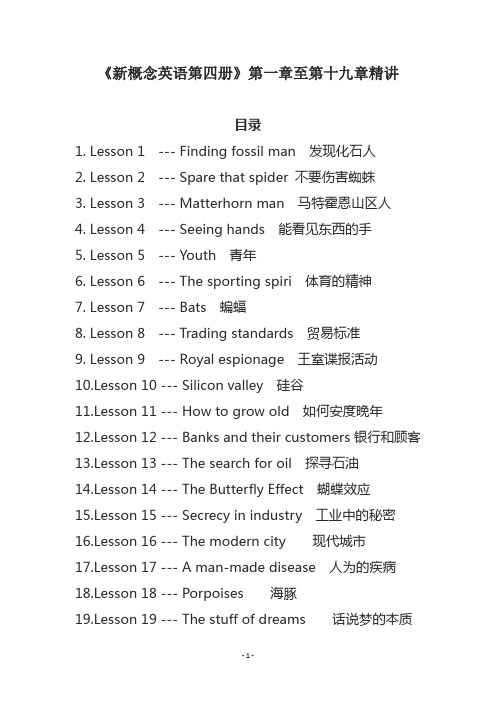
《新概念英语第四册》第一章至第十九章精讲目录1. Lesson 1 --- Finding fossil man 发现化石人2. Lesson 2 --- Spare that spider不要伤害蜘蛛3. Lesson 3 --- Matterhorn man马特霍恩山区人4. Lesson 4 --- Seeing hands能看见东西的手5. Lesson 5 --- Youth青年6. Lesson 6 --- The sporting spiri 体育的精神7. Lesson 7 --- Bats蝙蝠8. Lesson 8 --- Trading standards贸易标准9. Lesson 9 --- Royal espionage 王室谍报活动10.Lesson 10 --- Silicon valley 硅谷11.Lesson 11 --- How to grow old 如何安度晚年12.Lesson 12 --- Banks and their customers银行和顾客13.Lesson 13 --- The search for oil 探寻石油14.Lesson 14 --- The Butterfly Effect 蝴蝶效应15.Lesson 15 --- Secrecy in industry 工业中的秘密16.Lesson 16 --- The modern city 现代城市17.Lesson 17 --- A man-made disease 人为的疾病18.Lesson 18 --- Porpoises 海豚19.Lesson 19 --- The stuff of dreams 话说梦的本质Lesson 1Finding fossil man 发现化石人Why are legends handed down by storytellers useful?We can read of things that happened 5,000 years ago in the Near East, where people first learned to write. But there are some parts of the world where even now people cannot write. The only way that they can preserve their history is to recount it as sagas -- legends handed down from one generation of storytellers to another. These legends are useful because they can tell us something about migrations of people who lived long ago, but none could write down what they did. Anthropologists wondered where the remote ancestors of the Polynesian peoples now living in the Pacific Islands came from. The sagas of these people explain that some of them came from Indonesia about 2,000 years ago. But the first people who were like ourselves lived so long ago that even their sagas, if they had any, are forgotten. So archaeologists have neither history nor legends to help them to find out where the first 'modern men' came from.Fortunately, however, ancient men made tools of stone, especially flint, because this is easier to shape than other kinds. They may also have used wood and skins, but these have rotted away. Stone does not decay, and so the tools of long ago have remained when even the bones of the men who made them have disappeared without trace.New words and expressions 生词与短语fossil man (title)adj. 化石人Recountv. 叙述Sagan. 英雄故事Legendn. 传说,传奇Migrationn. 迁移,移居Anthropologistn. 人类学家Archaeologistn. 考古学家Ancestorn. 祖先Polynesianadj.波利尼西亚(中太平洋之一群岛)的Indonesian. 印度尼西亚Flintn. 燧石Rotn. 烂掉本文参考译文我们从书籍中可读到5,000 年前近东发生的事情,那里的人最早学会了写字。
新概念英语第四册美音版听力课程
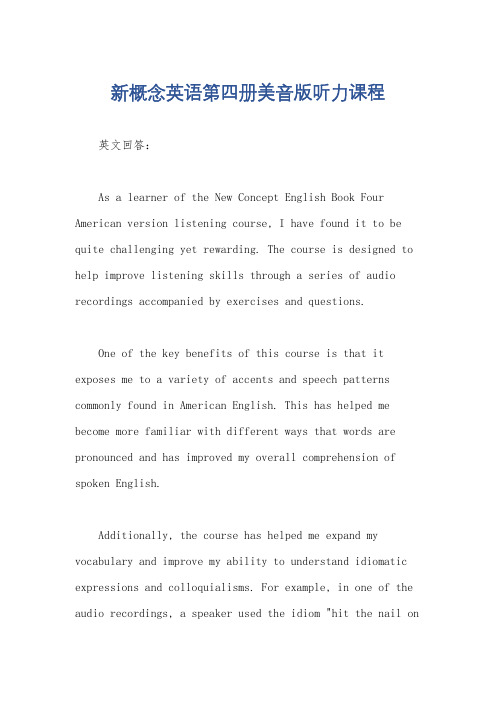
新概念英语第四册美音版听力课程英文回答:As a learner of the New Concept English Book Four American version listening course, I have found it to be quite challenging yet rewarding. The course is designed to help improve listening skills through a series of audio recordings accompanied by exercises and questions.One of the key benefits of this course is that it exposes me to a variety of accents and speech patterns commonly found in American English. This has helped me become more familiar with different ways that words are pronounced and has improved my overall comprehension of spoken English.Additionally, the course has helped me expand my vocabulary and improve my ability to understand idiomatic expressions and colloquialisms. For example, in one of the audio recordings, a speaker used the idiom "hit the nail onthe head" to mean that someone made a correct or accurate statement. This was a new expression for me, but thanks to the course, I was able to understand its meaning and use it in my own conversations.Overall, I believe that the New Concept English Book Four American version listening course has been instrumental in helping me improve my listening skills and become more proficient in understanding spoken English.中文回答:作为新概念英语第四册美音版听力课程的学习者,我发现这门课程既具有挑战性,又非常有益。
新概念英语第四册听力美音
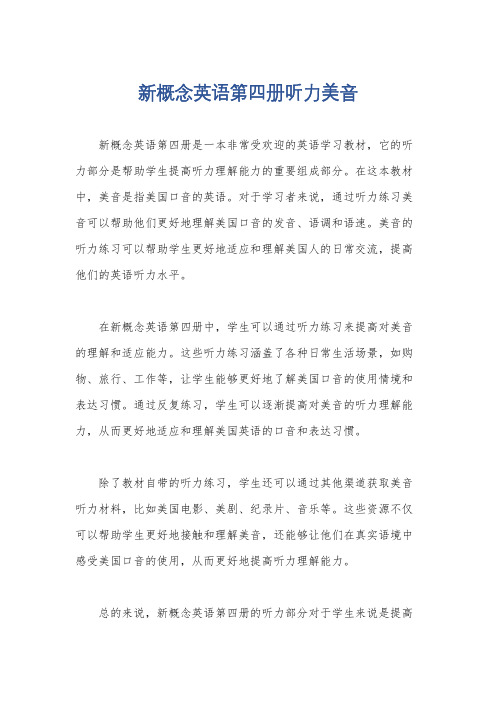
新概念英语第四册听力美音
新概念英语第四册是一本非常受欢迎的英语学习教材,它的听力部分是帮助学生提高听力理解能力的重要组成部分。
在这本教材中,美音是指美国口音的英语。
对于学习者来说,通过听力练习美音可以帮助他们更好地理解美国口音的发音、语调和语速。
美音的听力练习可以帮助学生更好地适应和理解美国人的日常交流,提高他们的英语听力水平。
在新概念英语第四册中,学生可以通过听力练习来提高对美音的理解和适应能力。
这些听力练习涵盖了各种日常生活场景,如购物、旅行、工作等,让学生能够更好地了解美国口音的使用情境和表达习惯。
通过反复练习,学生可以逐渐提高对美音的听力理解能力,从而更好地适应和理解美国英语的口音和表达习惯。
除了教材自带的听力练习,学生还可以通过其他渠道获取美音听力材料,比如美国电影、美剧、纪录片、音乐等。
这些资源不仅可以帮助学生更好地接触和理解美音,还能够让他们在真实语境中感受美国口音的使用,从而更好地提高听力理解能力。
总的来说,新概念英语第四册的听力部分对于学生来说是提高
对美音理解能力的重要训练,通过系统的听力练习和接触真实语境中的美音材料,学生可以更好地适应和理解美国口音的发音、语调和语速,从而提高英语听力水平。
新概念第四册句子精粹Lesson33教育英语听力
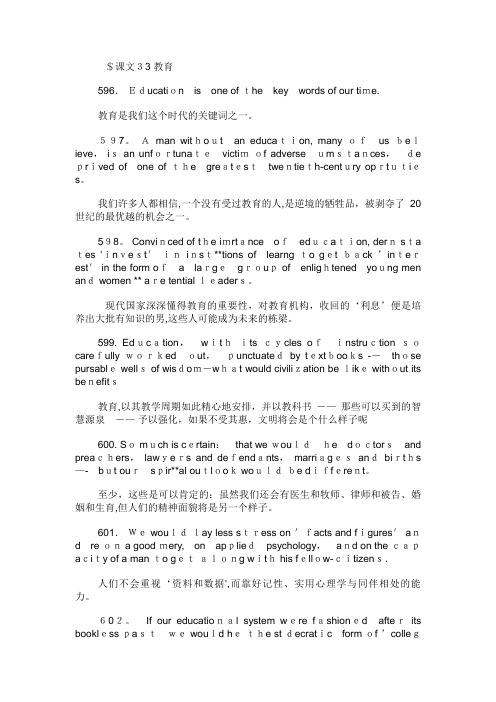
$课文33 教育596.Education is one of the key words of our time.教育是我们这个时代的关键词之一。
597。
Aman without an education, many ofus believe,isan unfortunatevictimof adverseumstances,de prived of one of the greatesttwentieth-century oprtuties。
我们许多人都相信,一个没有受过教育的人,是逆境的牺牲品,被剥夺了20世纪的最优越的机会之一。
598。
Convinced of the imrtance ofeducation, dern sta tes 'invest'ininst**tions of learng to get back ’interest' in the form ofa largegroup of enlightened young men and women ** are tential leaders。
现代国家深深懂得教育的重要性,对教育机构,收回的‘利息’便是培养出大批有知识的男,这些人可能成为未来的栋梁。
599. Education,withits cycles ofinstruction socarefully workedout,punctuatedby textbooks --those pursable wells of wisdom-what would civilization be like without its benefits教育,以其教学周期如此精心地安排,并以教科书-—那些可以买到的智慧源泉-—予以强化,如果不受其惠,文明将会是个什么样子呢 600. So much is certain:that we wouldhe doctorsand preachers,lawyers and defendants,marriagesandbirths —-but ourspir**al outlook wouldbe different。
- 1、下载文档前请自行甄别文档内容的完整性,平台不提供额外的编辑、内容补充、找答案等附加服务。
- 2、"仅部分预览"的文档,不可在线预览部分如存在完整性等问题,可反馈申请退款(可完整预览的文档不适用该条件!)。
- 3、如文档侵犯您的权益,请联系客服反馈,我们会尽快为您处理(人工客服工作时间:9:00-18:30)。
新概念英语第四册听力资料:Education Education
教育
First listen and then answer the following question.
听录音,然后回答以下问题。
Why is education democratic in bookless, tribal societies?
Education is one of the key words of our time. A man without an education, many of us believe, is an unfortunate victim of adverse circumstances, deprived of one of the greatest twentieth-century opportunities. Convinced of the importance of education, modern states 'invest' in
institutions of learning to get back 'interest' in the form
of a large group of enlightened young men and women who are potential leaders. Education, with its cycles of instruction so carefully worked out, punctuated by textbooks -- those purchasable wells of wisdom - what would civilization be like without its benefits? So much is certain: that we would have doctors and preachers, lawyers and defendants, marriages and births -- but our spiritual outlook would be different. We would lay less stress on 'facts and figures' and more on a good memory, on applied psychology, and on the capacity of a man to get along with his fellow-citizens. If our educational system were fashioned after its bookless past we would have the most democratic form of 'college' imaginable. Among
tribal people all knowledge inherited by tradition is shared by all; it is taught to every member of the tribe so that in this respect everybody is equally equipped for life.
It is the ideal condition of the 'equal start' which only our most progressive forms of modern education try to regain. In primitive cultures the obligation to seek and to receive the traditional instruction is binding to all. There are no 'illiterates' -- if the term can be applied to peoples without a script -- while our own compulsory school attendance became law in Germany in 1642, in France in 1806, and in England in 1876, and is still non-existent in a number of 'civilized' nations. This shows how long it was before we deemed it necessary to make sure that all our children could share in the knowledge accumulated by the 'happy few' during the past centuries.
Education in the wilderness is not a matter of monetary means. All are entitled to an equal start. There is none of the hurry which, in our society, often hampers the full development of a growing personality. There, a child grows up under the ever-present attention of his parent; therefore the jungles and the savannahs know of no 'juvenile delinquency'. No necessity of making a living away from home results in neglect of children, and no father is confronted with his inability to 'buy' an education for his child.JULIUS E. LIPS The Origin of Things
New words and expressions 生词与短语
adverse
adj.
purchasable
adj.可买到的
preacher n. 传教士defendant n. 被告outlook
n. 视野capacity n. 水平democratic adj. 民主的tribal
n. 部落的tribe
n. 部落illiterate n. 文盲compulsory adj. 义务的deem
v. 认为means。
